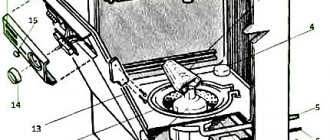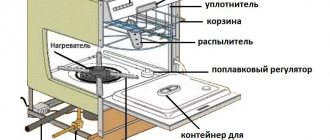The question of whether a dishwasher is needed is often heard today, regardless of how many people live in the house/apartment. Such a unit is used along with other household appliances; it has become a familiar attribute of the kitchen, so it is sometimes included in the design project of the room by default, like a microwave oven or a kettle. However, there is not always free space in the room, so you need to determine for yourself the feasibility of such a purchase.
Why do you need a dishwasher?
The main purpose of using such technology is to make life easier and provide the opportunity to do personal business instead of washing dishes. People are developing new units to save time and effort. As a result, the number of equipment increases, and it is often difficult to choose the most necessary one. A dishwasher can hold quite a lot of dishes, depending on its size. Once this technique is launched, no human intervention is required. The unit will do everything on its own: clean the dishes, dry them, and turn off when the full cycle is completed.
When the device is finished working, a person only needs to unload the dishes and put them in their places. But this is not necessary either, since such units are often started using the “Delayed Start” function. As a result, cleaning of all cookware sets may be completed later. This means you don’t need to free the machine right away. This can be done when free time appears. In this case, the device does not consume electricity, because it is turned off.
If you are wondering whether the unit saves resources (effort and time), you need to figure out what kind of work the machine does. So, if there is no such equipment in the house, then you need to wash the dishes every day, which is associated with an increase in water consumption. In addition, it will not be possible to put the devices in place right away. You need to spend time wiping down the dishes and then putting them back in place. Moreover, dry plates, glasses and other items will remain on the table until they dry. During this period, other tasks are not completed, because the person is busy washing dishes.
Under the conditions described, there is no doubt that purchasing a dishwasher will pay off.
However, if there are 2-3 people in a family or 1 man or woman lives in a house, the issue of purchasing such equipment is more acute, since the amount of dishes in these cases is much less. If some family members are often absent (at work, on a business trip), having breakfast, lunch or dinner outside the home, then PMM for a family of 2 people may not be required.
Will a dishwasher help you save on water?
We calculate in which cases it is more profitable to wash dishes by hand, and when it is better to resort to the benefits of civilization.
– There are often advertisements for dishwasher detergent on TV, in which they claim that this miracle unit will help you significantly save on water. Is this really true?
To calculate costs, the portal's editors conducted a small experiment: we compared water meter readings before and after washing dishes. Of course, the number of people in a family is different for everyone, as is the number of dishes. But there are also general points. So, in addition to a set of dishes for each family member (plate, mug, fork or spoon), there are also related items: pots, pans, their lids, cutting boards, knives, etc., and cold and hot water (for those who do not have it turned off ) are spent approximately equally.
It is also worth considering that in winter, as a rule, we use more hot water than in summer, and tariffs in different areas of the city may differ. Thus, in the Novovyatsky district the cost of a cubic meter of cold water is 33.66 rubles, in Kirov - 28.42 rubles. In addition, we do not take into account the cost of dishwashing detergents - neither for the “manual” method, nor for the dishwasher. Our calculations will only concern water costs.
To wash the dishes after dinner for a family of two, it took 35 liters of water: 18 liters of cold and 17 liters of hot. The Kirov tariff for hot water is 163.98 rubles per cubic meter, for cold water - 28.42 rubles. In addition, you need to take into account the costs of sewerage at a tariff of 21.80 rubles. per cubic meter.
Let's do the math:
0.017x163.98 + 0.018x28.42 + 0.035x21.80 = 4.06 rubles
That's how much we spent on washing two sets of dishes.
Now let's move on to dishwashers. Water consumption will depend on the model and year of its manufacture: older cars consume more water than
On this topic
Will a water heater help you save on hot water?
9865
new models, but, as a rule, costs do not exceed 20 liters, and this is in the most uneconomical option. For modern dishwashers, 6.5 liters per cycle is sufficient. In addition, the selected mode also affects water consumption: for severe pollution, an intensive mode is used, which requires more water. On average, a small dishwasher (about 45 cm wide) can fit about nine sets of dishes, and if you are willing to leave unwashed cups and plates until the evening, you can wash all the dishes that have accumulated during the day in one go.
To calculate the cost of water for a dishwasher, we took average figures: 10 liters of cold water (it is heated directly in the machine).
0.010x28.42 + 0.010x21.80 = 0.5 ruble
It turns out that a dishwasher is more than 8 times more economical than the usual “manual” method.
It’s also worth noting that our little experiment was conducted on a weekday evening. On weekends, when you have breakfast, lunch and dinner at home, a lot more dishes get dirty. Accordingly, water consumption increases.
However, this “pure” comparison did not take into account energy costs. And in the case of a dishwasher, they are significant, because it has to heat the water itself.
A small dishwasher with 6 sets consumes approximately 0.6 kWh per cycle. The electricity tariff in Kirov from July 2021 is 3.95 rubles/kWh.
0.6x3.95 = 2.37 rubles
Thus, the total cost of water and electricity per cycle for the dishwasher will be
2.37 + 0.5 = 2.87 rubles
In total, according to our calculations, it turned out that with a dishwasher we save approximately 1.69 rubles per day. However, we note once again that for the calculation we took two sets of dishes and the cost of water for washing them only once a day. In the case of a “wholesale” load of the dishwasher, the savings will be 2-3 times higher.
We also decided to calculate how long it would take for such savings to pay for a dishwasher. On the websites of Kirov household appliance stores, prices range from 15 to 130 thousand rubles (excluding all kinds of promotions and discounts). A machine worth 15 thousand will pay for itself in 8,876 washes, and the most expensive unit - in 76,924 times. If we translate this into time indicators (when calculating 2 dishes per day), it turns out that the cheapest dishwasher will pay for itself in 12 years, and the most expensive one in 105. Frankly speaking, not quickly.
Briefly about the main thing:
1. To calculate costs, we took two sets of dishes with other kitchen utensils. Only one wash per weekday was taken into account.
2. The water and electricity consumption of a dishwasher depends on its capacity and year of manufacture. Given the total costs, such equipment will not pay for itself quickly.
3. Costs directly for water with the “manual” method of washing dishes exceed the costs of a dishwasher by more than 8 times.
If you have questions that you can't find the answer to, ask us and we will try to answer them.
Photo: propositive.ru
On this topic
2781
What to do if the deadline for major home repairs is constantly being postponed?
All the pros and cons
Considering that such equipment is quite expensive (15,000-60,000 rubles), before purchasing, you should determine for yourself the pros and cons of using it. It is necessary to study the properties of the selected device, evaluate the need to use various functions that are inherent in the design. The more there are, the more expensive the machine. This means that when the purchase issue has not yet been resolved, you should consider the possibility of reducing costs by choosing a more budget-friendly model with more suitable properties.
For example, a family of 2 people needs a compact unit, maybe even a desktop machine. The same recommendation is also suitable for cases when only 1 man or woman lives in the house. For a family of 3 or more people, consider models of a compact type or standard sizes. In this case, there are more dishes, and they are used constantly. Separately, you should evaluate how often guests are in the house. If regularly, then it is better to pay attention to a standard device.
To understand whether a dishwasher is necessary, the pros and cons are studied along with reviews from the owners of such equipment. The manufacturer does not always cover all the intricacies of operation, since some points can only be learned after a long service life. Based on this information, the pros and cons of purchasing the unit are weighed.
pros
When considering the advantages, you need to take into account the practical side of the issue, and not just the information about the unit offered by the manufacturer:
- it is possible to purchase a compact device, but this is not always possible, since the dimensions of the machine directly depend on how many sets should be placed inside, for example, standard-sized models are designed for 13-16 sets;
- the choice of location is not limited in any way - this is a misconception, since the device is connected to a cold water supply, so you need to place it as close to the pipeline as possible, and to install built-in appliances, one more condition must be met - the design must correspond to the size of the niche or cabinet of the kitchen unit;
- Another advantage of a dishwasher is the economical consumption of water and electricity, however, with intensive use, costs, on the contrary, increase if the device was chosen incorrectly (the class of washing, drying, and energy efficiency is taken into account);
- the noise level is quite low (only if the value of this parameter does not exceed 45 dB);
- the quality of washing is always high - this is not entirely true, for example, if you use inappropriate products, change their dosage, or do not take into account restrictions on use, then there is a high probability that stains will appear on the dishes;
- Another advantage of a dishwasher is the presence of auxiliary functions, but they are not always needed, for example, child protection is necessary in families with a child, and protection against leaks provides the required effect if it is complete and not partial, as in some models.
Minuses
When you study reviews, you can find many disadvantages of such a technique. However, only some of the disadvantages of the dishwasher are the result of design flaws. Most problems are caused by improper handling of the device. Myths that are often mistaken for shortcomings:
- a large amount of detergent is consumed: if you follow the instructions, the costs are not so significant;
- not all dishes fit, and some items cannot be washed in a machine: if you choose the right device, then the issue of capacity is resolved quickly, another thing is the manufacturer’s ban on cleaning pots, thin glass or wood, in this case the restrictions vary;
- the unit operates for a long time, during this period water and electricity are constantly consumed: such equipment consumes much less resources than those used in manual washing.
The only significant drawback of such devices is the low quality of cleaning dishes. This may be due to a violation of the washing technology (the soaking step was skipped), the intricacies of the selected device model (only 1 rocker is installed), errors in determining a suitable detergent or calculating its sufficient dose.
Over time, mold forms in the dishwasher, which is hazardous to health.
There really is such a problem, but it can also be eliminated by regular (at least once a month) cleaning of the PM chamber. Don’t forget to clean the drain too: mold can appear due to blockages.
It is also recommended to leave equipment slightly open between washes to dry it inside and prevent the appearance and growth of fungi.
To prevent mold growth, do not leave dirty dishes inside the dishwasher for too long.
Watch a useful video on how to choose, use and care for your dishwasher:
Using a dishwasher in any case involves additional financial costs. Savings on water are often offset by the costs of electricity and special detergents, which are more expensive than usual for hand washing. Therefore, benefit is not the most important factor for making a purchase decision. But there are certain situations when PM really becomes a necessity. If you have a large family, if you have two or more children, then most likely a lot of time is spent on housekeeping, and the dishwasher becomes an indispensable assistant that will free up precious 1-2 hours a day. Or maybe your rhythm of life simply physically does not allow you to devote even 10 minutes to washing dishes. Then this is the case when the purchase will also be justified and will bring more joy than disappointment.
conclusions
To decide whether a machine is necessary, the intensity of soiling and washing of dishes is assessed. They take into account the number of people in the house, as well as the frequency of visits by friends and relatives. It is advisable to purchase a device of this type for a large family. It is also necessary to take into account the consumption of resources (electricity, water). The dishwasher does not need hot water, since the unit heats it up on its own. This does not contribute to increased costs, because the cost of the coolant for the hot water supply system is higher.











